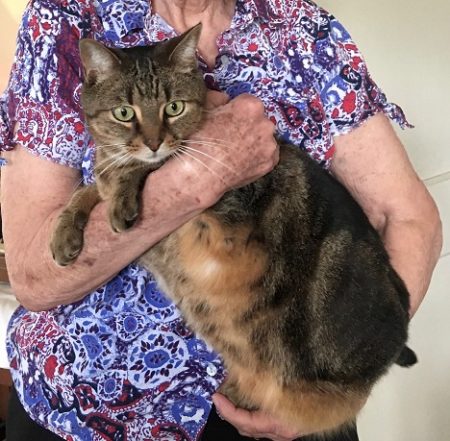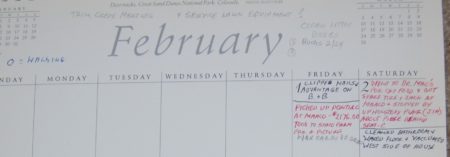Lifelong Florida resident, Ginny says, “As the years go by, some things don’t pop into my brain like they used to.”
I was inspired to interview Ginny* after learning from Becky*, about their half-century friendship. They met when Becky was in Ginny’s high school gym class.
“What was she good at?” I ask Ginny during our Zoom video call.
“Everything,” she answered.
Gym class was a memorable period for many of us and these two women remained friends even while living on opposite coasts.
In 2011, Becky noticed Ginny getting confused. “At times, she had difficulty remembering and processing information,” Becky says. “I encouraged Ginny to see a doctor.” This was long before Becky and her husband moved to Florida in 2017.
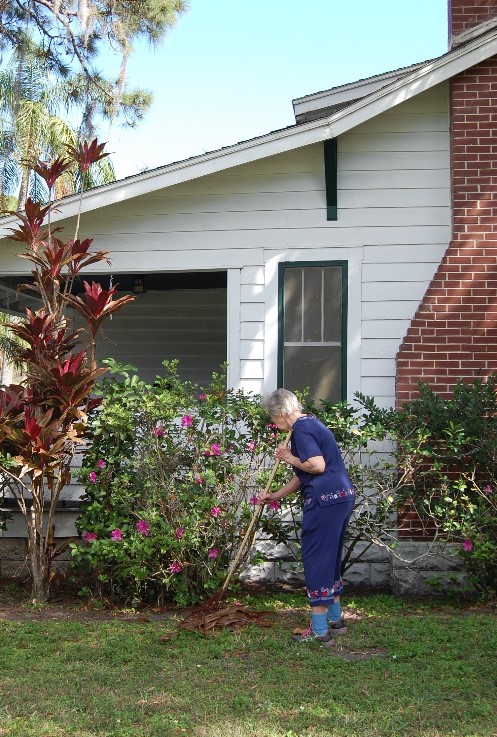 While Ginny shared her memories during our interview, I included a few of Becky’s observations in brackets.
While Ginny shared her memories during our interview, I included a few of Becky’s observations in brackets.
Younger-Onset Dementia Over the Age of 65?
While the diagnosis of “younger-onset dementia” is used with people before age 65, Becky said that in 2011, Ginny’s doctor diagnosed her with “early-onset dementia.” She was 71. (Not only is this the wrong label for someone older than 65, but the “early” label has been replaced by “younger”.)
“You know, we won five-world softball tournaments,” Ginny volunteers.
Throughout our call, she proudly recalls moments playing softball.
“When did you teach high school?” I ask.
“From ’61,” she hesitates a moment and looks left before adding with a laugh, “to ’91… a long time… too long.”
“You say you have memory problems; yet, you speak quickly. You come across as a vibrant person.”
“You have a nice personality,” she replies. “Things don’t come to me real quick like they used to.”
“Thank you, Ginny. What do you do to keep your memory?”
“I read the paper and play Sudoku.” She quickly adds, “You know, I played fast-pitch softball… played with the team. We were mostly PE teachers.”
“Wow, physical education teachers… the competition must have been fierce.”
“We traveled all over (she hesitates) the state.” [They traveled all over the country.]
“As a physical education teacher, what do you do now to keep your memory sharp?”
She looks to her left again, turns to look at the camera, and then down, “I don’t play sports anymore. I live in a house with a yard… I get out and move my body. I have a yard on either side. I get out and mow the grass.” [She hasn’t mowed the lawn lately due to concerns about her balance. But she still rakes.]
“Wow. Ginny. So, you are able to get out and about.”
“And I take care of my cat.”
“You have a cat?”
Ginny’s Cat – Bozo, Buckie Wheat, or __?
“Yes, a nice cat.”
“Well, you know what they say, Ginny, you should feel privileged that the cat allows you to live in the same house.”
She laughs. “You have a nice personality.”
“What do you call your cat?”
“Bozo… sometimes, Buckie Wheat.”
“Does it come when you call it?”
She looks around, “I don’t know where he is right now,” she chuckles.
[Bozo and Buckie Wheat died. This cat is Luke.]
“No one diagnosed me.”
“Ginny, when were you diagnosed with memory loss?
She looks down, “No one told me. I’m not supposed to be driving a car. I know how to drive, but I don’t want to cause a problem.” [The first neurologist said, while pointing to Ginny, ‘She’s demented.’ I fired her. I found a nicer doctor whom Ginny likes.]
Ginny looks left again.
“Ginny, what is to your left that you keep looking at?”
“The street and there’s a person walking on it.”
“Oh. I bet your view is nice. What else do you do to keep active?”
“I walk to the grocery store.” [She doesn’t walk far anymore, since her hip replacement and ACL tear two years earlier.]
“I bet all this exercise keeps you in shape.”
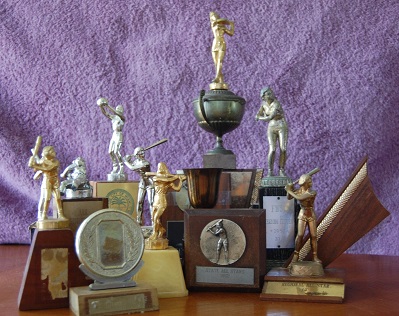 She pauses, “This growing up is difficult… you know I had a 405-batting average… in fast-pitch softball. You, know the underhand roll like this. (She demonstrates by spinning her arm while holding an imaginary ball.)
She pauses, “This growing up is difficult… you know I had a 405-batting average… in fast-pitch softball. You, know the underhand roll like this. (She demonstrates by spinning her arm while holding an imaginary ball.)
“Wow, Ginny, really? That’s better than the Major Players’ averages.
“What else do you do?”
“I see friends. I have a house and I have to take care of the yard.”
Advice to others with memory loss
“What is your advice to others living with memory loss?”
“That they greet each other and talk back and forth the best they can. People get together and communicate with one another.”
“How do you do this, Ginny?”
“I call up my friends and ask, ‘Do you want to have a toddy for the body?’”
I laugh heartily at her rhyming health invitation to her friends.
[She used to call people but confuses the phone and TV remote control buttons. She loves to visit with guests and is an entertaining hostess.]
Ginny volunteers, “I take after my mother who was an absolutely funny lady.”
“You have a good sense of humor,” she compliments me.
(This is the first interview with a person with dementia who compliments me repeatedly. It feels nice, actually!)
“Thank you, Ginny,” I say amidst our laughter.
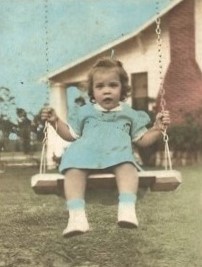 “She’s since passed,” Ginny volunteers, referring to her mother. “I’m the only one left in the family. I’m holding the fort, here.”
“She’s since passed,” Ginny volunteers, referring to her mother. “I’m the only one left in the family. I’m holding the fort, here.”
Learning from Becky that her brother is still alive, I ask, “You mean, your sister is gone, too?”
She says, “My sister’s passed away.”
“Do you have any children?”
“Absolutely no children… no husband,” she replies. “I’m the only one to carry on.”
“You say you have memory problems. What do you have difficulty remembering, Ginny?”
“Things I’m trying to remember people’s birthdays.”
“Gee, Ginny! Today, we have it easier with online calendars and Facebook to remind us of birthdays!”
She offers me another compliment. I ask, “How do you remember, people’s birthdays?”
“I make marks in the calendar.” [She used to write reminders and everything she did on the calendar. She’s kept them all – they are her journals, really.]
“As a gym teacher who wants to stay in shape, do you also eat well?”
“I eat properly… everything that’s nutritionally sound… meats and veggies. I played fast-pitch softball.”
“You’re the fast-pitch softball goddess,” I say. “Ginny, have you been diagnosed by a doctor for your memory loss?”
“I do see the doctor every year, but it’s for a physical. I don’t talk about my mind. I keep a tablet and write things down. This way I know what to get when I need groceries.” [For years, she had a tablet to keep lists, but no longer. The live-in caregiver buys groceries.]
What a testament of a wonderful enduring friendship over a half-century. The high school gym teacher and her student agree: We’ll be buddies, forever.
*Ginny and Becky are not their real names in order to preserve their privacy.


